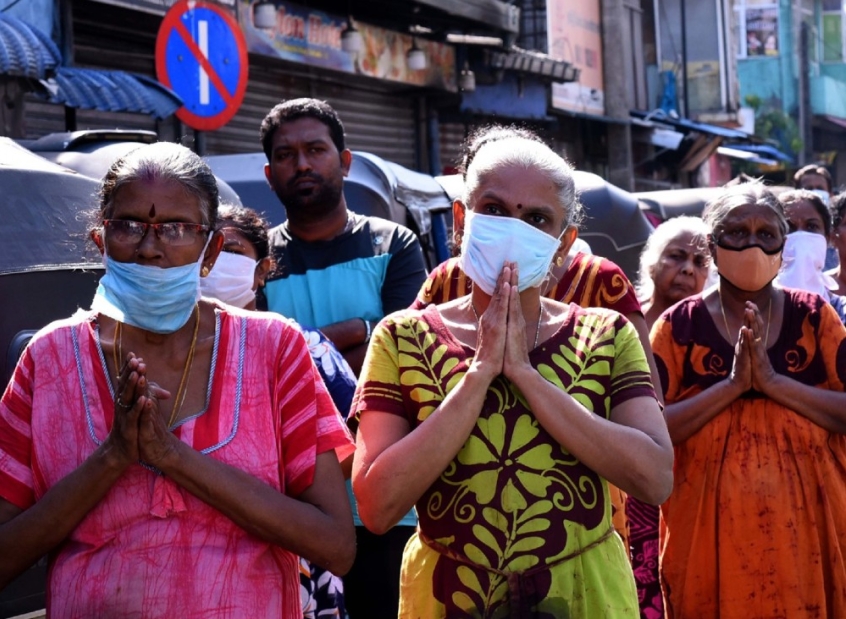
On that very first Easter, Jesus called on his friends, his disciples, to watch and pray. He needed them to stand with him as he was sweating blood in the garden of Gethsemane. But they could not. Whether they were afraid or just exhausted, they were unable to join him in his hour of need and watch and pray.
This Easter, Christians find themselves the target of extremists, who want to capture the world's attention by stamping their feet and causing destruction. Let's do for them what the disciples were unable to do for Jesus, let's watch and pray, writes Andrew Boyd of Release International.
The attacks started earlier this year in Indonesia, when a newlywed couple in their 20s detonated a pressure cooker bomb at a church in Makassar. The bomb, packed with high explosives and nails, killed the couple themselves and wounded 20 Christians. The attack was timed for Palm Sunday.
For Christians in Indonesia and Sri Lanka, it's becoming an all-too familiar pattern.
But when the focus of news moves away from the churches which have been attacked, and the bombers themselves move on, what happens to the Christians and the communities that are left behind, torn apart by the explosions?
Beauty for ashes
God has a way of giving beauty instead of ashes, and the oil of gladness instead of mourning. He has a way of bringing redemption.
In Indonesia and Sri Lanka this Easter, Christians are turning out in their churches, as ever, to celebrate and give thanks for what Christ has done for them on the cross. They know their churches have been targeted by extremists in the past and could be again. But still they worship.
In Easter 2019, suicide bombers targeted Christians in Sri Lanka, claiming the lives of some 250, and injuring twice that number.
And in May the previous year, in Indonesia, an entire family set out to kill as many Christians as they could.
They were members of JAD, Jemaah Anshorut Daulah, a group affiliated to Islamic State, who have a track record in bombing churches. They detonated explosives at churches in Indonesia in 2018, and it is probably JAD who struck there again in 2021.
READ MORE: After Easter church bombings, a new threat is rising for Sri Lanka's Christians
This year, they only succeeded in wounding. But in 2018, they killed 28 and injured 57 others. The victims included themselves – the 13 suicide bombers who coordinated their attacks on three churches and police headquarters. One of the attackers was a mother who set out to blow herself apart, along with her two daughters.
It is by the grace of God that many more did not die as a bomb disposal unit discovered two other devices near Surabaya's Central Pentecostal Church and was able to defuse them.
It could have been worse in Sri Lanka, too, in 2019. The blast at Zion Church in Batticaloa was caught by a church van stranded in the courtyard because the pastor couldn't find the keys to remove it. Even so, the explosion still killed at least 25 and destroyed the church.
'Mother of Satan'
The jihadists refer to their favoured bomb of choice as the 'mother of Satan'. This was the type of bomb they used in attacks on churches in Indonesia the previous year, as well as the bombings in Paris in 2015 and Manchester in 2017. The same explosives, the same hate.
In Sri Lanka, that hatred comes in many guises. Christians in Sri Lanka have come to expect persecution at the hands of Buddhist militants, which to Western ears, may sound like a contradiction in terms. But there is a growing nationalist movement in the country which believes that to be Sri Lankan is to be a Buddhist.
Buddhist monks have led attacks against churches and prayer meetings. In one attack in the north of the country, Buddhist monks led a mob of 150 to break up a Sunday morning service at a house church. Later that day, they beat up the pastor, his family and eight other church members.
But in 2019, the attackers were jihadis, affiliated to Islamic State.
In Indonesia, the troubles with jihadists go back a further 20 years. It began in 1999, when white-clad militants wielding swords killed around 10,000 Christians and drove ten times as many from their homes. The big difference, two decades later, is that war is no longer waged with traditional swords, but with high explosives.
Indonesia is the most populous Muslim-majority nation on earth. But it is still home to more than 30 million Christians, around ten per cent of the population. Sri Lanka is a Buddhist-majority nation, where Christians form a minority behind Hindus and Muslims, making up some seven per cent of the population.
The churches destroyed by militants in both countries can always be rebuilt, but the damage to the lives and livelihoods runs much deeper.
When media attention has moved on, those who've been wounded and traumatised must find a way to continue. And as Christians, they know the call on their lives is to do more than just survive. Their call is to overcome their suffering by faith and allow God to redeem their brokenness and make something holy and remarkable from it, that will work for the redemption of others.
Will you watch and pray a while with just a few of these remarkable people? We've had to change their names and alter some details to protect their identities.
Amisha was standing close to the entrance of her church when a minivan ploughed into the gate and exploded. It set off a firestorm in the petrol tanks of 35 vehicles parked nearby. Those flames enveloped Amisha, scorching 85 per cent of her body, including her face, leaving her permanently disfigured.
She was in hospital for three months and had to undergo 21 operations to peel the burnt skin from her body. Even today, her feet still bear the pattern of the sandals branded into them on the day of the bombing. Her skin is so fragile, she can no longer hug her daughter.
Overcomer
There are many things Amisha has had to overcome: the fear of leaving home, the shame when people look at her and gasp. But she has forgiven those who did this to her.
She told Release International partners: 'I am not a woman who keeps the anger. I am a woman who likes to surrender all to God.'
The depth of that surrender could be seen most clearly in the way Amisha handles her disfigurement. People can't help but stare at her scars. But instead of recoiling, she now asks the question: 'How can I be used in this situation?' And if people ask her about her burns, she goes on to tell them about Jesus.
Amisha has handed her pain over to the Lord and wants him to use it so his Kingdom will come.
In Sri Lanka, Martha was sitting close to the door of her church when she was caught in the bomb blast. She is still in excruciating pain from the pieces of shrapnel the doctors are unable to remove. On some days she prays to die.
Through it all, she believes, God has a purpose: 'I was very close to the attacker. People behind me died and were burned, but God preserved me. He must have a plan.'
Sarah was just seven when the explosion at Zion church killed both her parents. And the blast left her blinded.
Perhaps her mum and dad had a premonition of what was to come. Her mother had been urging her family to 'prepare for heaven', and her father had recently had a vision of Jesus welcoming him there.
For months to come, Sarah underwent treatment in intensive care and still needs surgery on her eyes.
But her response is a model of faith for us all.
She explains that Jesus has prepared new eyes for her. She told her relatives: 'Why cry? My parents are with Jesus. One day we will all go to be with Jesus.'
Sarah has accepted that she is blind, she is scarred, and she is an orphan. But such is this little girl's faith, she cannot be said to be a victim. Sarah is a victor.
Others have been traumatised by what they have witnessed. And some will live with the trauma in their bodies for the rest of their lives. One farmer was paralysed from his waist down by a piece of shrapnel. The blast also damaged his speech and has left him gripped by epileptic seizures.
These are Christians and communities who now need long-term support, even though the media spotlight, and the attention of their attackers has moved on.
Release International and its partners worldwide have been working together to support the Christians of Sri Lanka. This includes helping to cover their medical expenses, which are ongoing.
In crises such as these, there is a need to provide immediate emergency aid, then to help people during the recovery stage, and then to rebuild – their communities, their livelihoods and their lives.
Rebuilding
Zion Church has had to be rebuilt in the aftermath of the Easter attacks. Its pastor, Silas, told Release International partners his congregation had been greatly encouraged by the physical and spiritual support they received.
'Many came from around the world,' he said. 'They came and delivered a message from God. It helps us to understand what happened. We were strengthened by God. We were able to see the love of God.'
The pastor's first message after the bombings was taken from Romans 8:28, 'And we know that for those who love God all things work together for good, for those who are called according to his purpose.'
In Surabaya, Indonesia, once again there is evidence of the same grace at work. The pastor of one church attacked there in 2018, Joseph, said Christians will continue to show the love of God to their Muslim neighbours.
He encouraged his congregation not to run away after the attacks. 'We wanted to show that we love God, and when we love God, the less afraid we are of persecution in our life.'
Pastor Joseph said many Muslim neighbours stood outside their homes to watch as Christians returned to worship. 'A neighbour said, "when Christians get a problem like this, they are not afraid; they are still faithful to God."'
Church members are working to demonstrate their continuing love to the community. They provide food for Muslims after Ramadan and run a medical clinic where every patient, including Muslims, can receive care at low cost or free of charge.
Likewise, in Sri Lanka, the church has refused to go into retreat. A new church has been planted in an area considered to be a militant stronghold and has already grown to about 100 people.
Death threats
It hasn't been easy. The pastor has received death threats and had a gun pointed at him outside the church.
But he and his congregation have accepted that persecution is an everyday part of Christian life, as is obedience to Christ's command to love your neighbours as yourselves – even if they choose to remain your enemies.
At the rebuilt Zion Church, services have resumed with renewed zeal. The four-hour services include two hours of worship, an hour of prayer and an hour-long message.
Pastor Eric, one Release International partner who has been helping the Christians of Sri Lanka, said: 'The bombing did not drive Christians away from the church, but it is driving them out to the mission field to share the gospel.'
Thank you for watching and praying with our suffering brothers and sisters at Easter, and for sharing in their Gethsemane.
It can often be easier to make light of troubles, or to find them so discouraging that we cannot bear to watch.
But in my years of reporting on the persecuted church around the world, I have had a sense that when we make that decision to watch and pray, to bear one another's burdens for a time and lift them to the Lord, we are reversing the abandonment that Jesus suffered at Gethsemane, when his disciples, overwhelmed, simply left Him to it.
When we watch and pray for our persecuted brothers and sisters, we are watching and praying with him.
This is part of a poem, written by Release International's partners in Sri Lanka, NCEASL:
Burdened with loss,
Paralysed by pain,
Yet, in this city we remain,
Piece-by-piece we work to restore,
Light covers the cracks and hurt within.
In this we continue to live,
That is our hope,
And love in Christ will win.
Andrew Boyd is a spokesman for Release International, a UK-based charity which supports persecuted Christians in some 25 countries around the world. www.releaseinternational.org. Source material adapted with thanks from Release International's partners in the International Christian Association, the Voice of the Martyrs USA.













